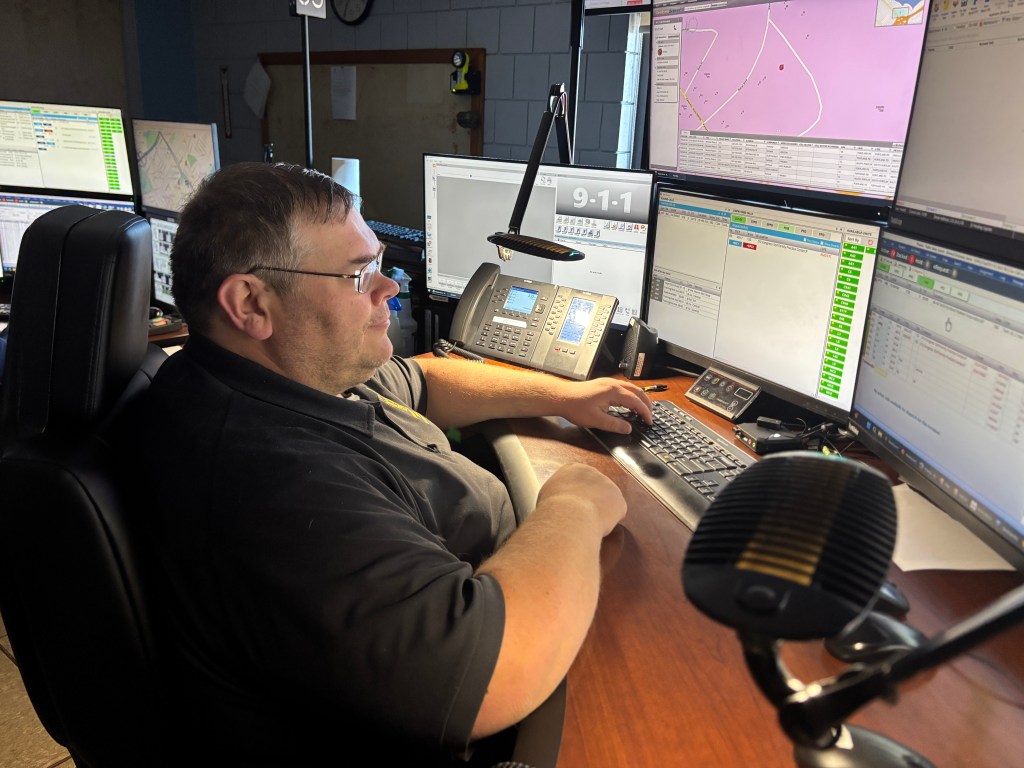
Kevin Dickinson answered the call.
It was a woman’s voice on speaker, and she sounded scared. The dispatch room was dark, except for the glow from the screens.
He started asking protocol questions. “Where are you? What’s your phone number in case we lose connection?” He could hear her wincing and breathing heavily.
“Help is on the way,” he said. It was the 50th or 100th time he said it that shift. He’d lost count.
The sounds became more frenzied. He knew she was in labor, and he knew it was urgent.
Based on her address in South Portland, he knew it would take a matter of minutes for someone to arrive on the scene. He hoped they would be fast enough. They weren’t.
She stopped answering his questions. He heard excited voices in the background.
“That’s when I heard the baby cry over the phone,” Dickinson said. He could hear happy noises, the voices attending to the mother and the baby.
Over the open line, he heard the firefighters arrive on the scene and say, “Congratulations.” He felt relief rush over him.
“That’s when it hit,” he said. “Everything is ok, and we did this. A newborn’s cry is like no other.”
The firefighters transported the mother and child to Mercy Hospital, according to a fire department Facebook post. The day after the birth, the family was recovering, and the baby boy was healthy.
Dickinson, who has been an emergency communication supervisor for nearly 20 years, has answered hundreds of pregnancy related calls.
“Most people call us on their worst days of their life,” he said. “This is different. You’re bringing a life into the world instead of fighting to save a life.”
He’s trained to talk people through all variety of medical emergencies, ranging from chest pain to childbirth. “Labor is particularly involved,” he said, with lots of different questions and information to provide depending on the quickly changing circumstances. “A lot of things could go wrong.”
Dickinson said he remained calm, for the most part.
“There’s really not much time during the call for you to get your own feeling mixed up in it,” he said. It all happened so quickly, in a matter of minutes. And it was hard to not be able to see what was happening.
“After the call, you can find time to breathe,” he added.
That’s the nature of the job, he said. Your adrenaline spikes every couple of minutes. It’s part of the reason not too many people last as long as he has in a career as an emergency dispatcher. That stress is part of the reason Dickinson couldn’t recall a few details of the interaction days later, such as where the woman was during the call.
“As soon as you hang up, that phone could be ringing again,” he said. “So you adjust and you move on.” After particularly stressful calls, Dickinson grounds himself by going for a walk around the block.
And it’s calls like this one that remind Dickinson why he does this, why he works 12 hour shifts coaching people through stressful emergencies.
“We’re here to make sure that people have an instant connection to help,” he said. “They often call us the first first responder.
“We’re usually on the scene, albeit over the phone, before anyone else is.”

We invite you to add your comments. We encourage a thoughtful exchange of ideas and information on this website. By joining the conversation, you are agreeing to our commenting policy and terms of use. More information is found on our FAQs. You can modify your screen name here.
Comments are managed by our staff during regular business hours Monday through Friday as well as limited hours on Saturday and Sunday. Comments held for moderation outside of those hours may take longer to approve.
Join the Conversation
Please sign into your CentralMaine.com account to participate in conversations below. If you do not have an account, you can register or subscribe. Questions? Please see our FAQs.